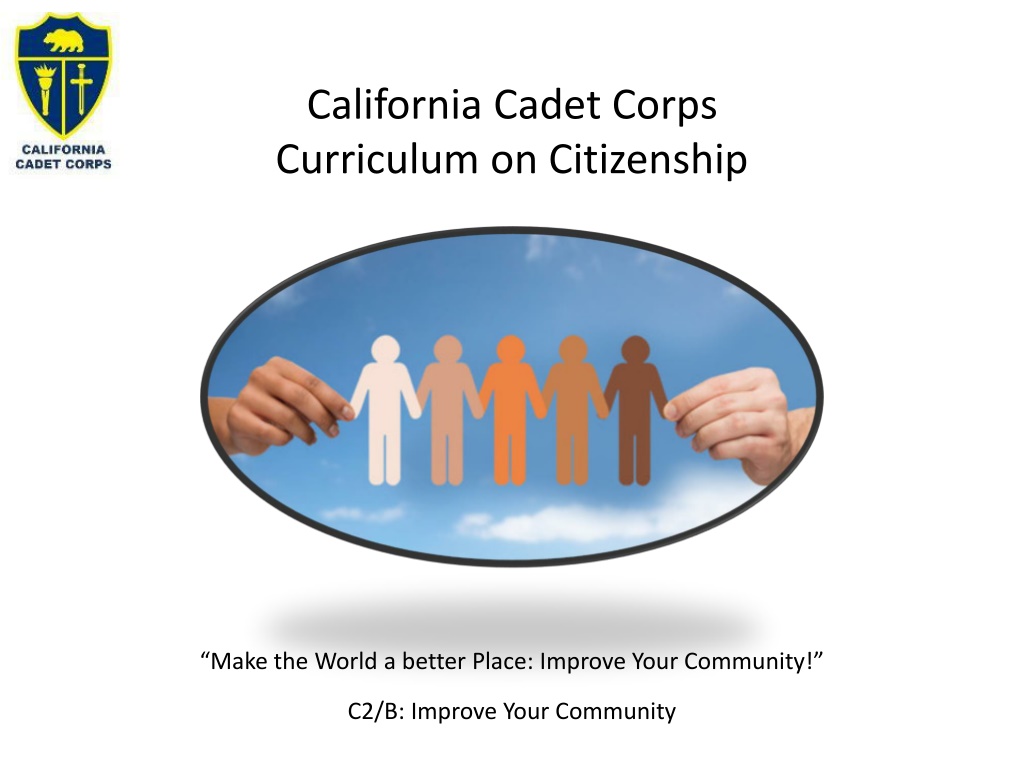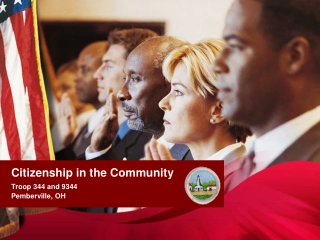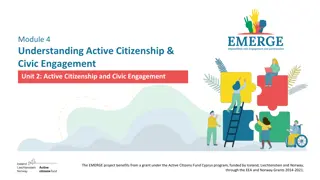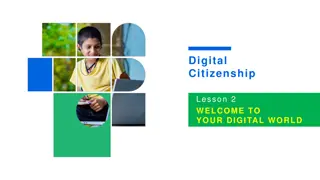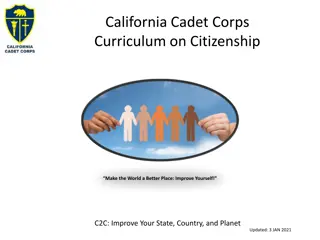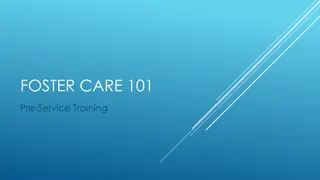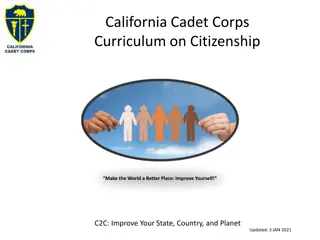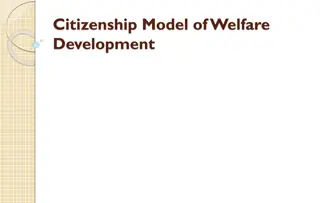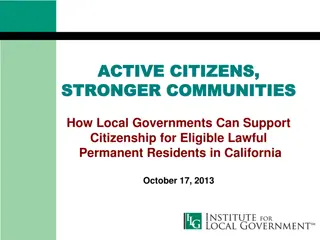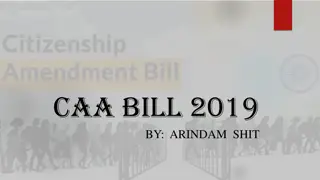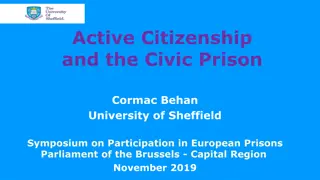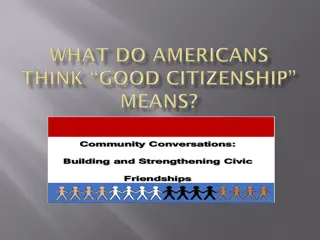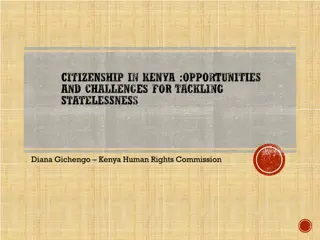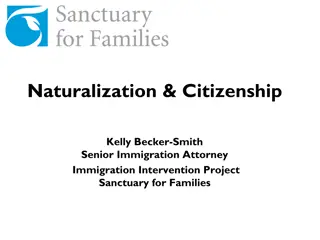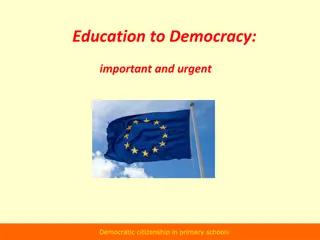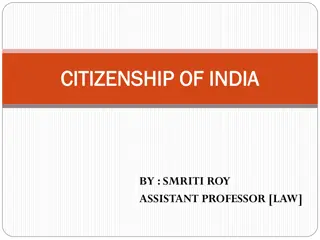Ways to Improve Your Community and Foster Citizenship
The California Cadet Corps Curriculum emphasizes citizenship skills for cadets to serve their community better. The agenda includes voting, participating in community service, and engaging with local government. By registering to vote, attending school board meetings, and taking part in community projects, cadets can actively contribute to making a positive impact. Learning about voting procedures and responsibilities as citizens during elections is crucial for fostering civic engagement.
Download Presentation

Please find below an Image/Link to download the presentation.
The content on the website is provided AS IS for your information and personal use only. It may not be sold, licensed, or shared on other websites without obtaining consent from the author. Download presentation by click this link. If you encounter any issues during the download, it is possible that the publisher has removed the file from their server.
E N D
Presentation Transcript
California Cadet Corps Curriculum on Citizenship hands holding chain of people pictogram over sky Make the World a better Place: Improve Your Community! C2/B: Improve Your Community
Agenda B1. Voting B2. Speaking/Testifying to Government B3. Individual Community Service Opportunities B4. Unit Community Service Opportunities
Improve Your Community OBJECTIVE Cadets will have a better concept of how they may better serve their community and will actively seek to do so. Plan of Action At your 18th birthday, register to vote, seek information regarding the candidates and initiatives, and vote responsibly in every election Attend a meeting of your local School Board, determine its procedures (how to get onto the agenda, rules for speaking, how the meetings proceed) Select an individual community service project and spend a minimum of three hours in support of it; ensure your CACC unit logs your hours Participate in a unit community service project with cadets from your CACC battalion
VOTING B1. At your 18th birthday, register to vote, seek information regarding the candidates and initiatives, and vote responsibly in every election.
Voting OBJECTIVES Cadets will have a better concept of how they may better serve their community and will actively seek to do so. Plan of Action At your 18th birthday, register to vote, seek information regarding the candidates and initiatives, and vote responsibly in every election. Essential Question: What are my responsibilities as a citizen during elections?
Voting Defined vote \ v t \ 1: to express one's views in response to a poll; especially: to exercise a political franchise 2: to express an opinion; consumers vote with their dollars Lucia Mouat transitive verb 1: to choose, endorse, decide the disposition of, defeat, or authorize by vote; he was voted out of office 2a: to adjudge by general agreement : DECLARE b: to offer as a suggestion : PROPOSE intransitive verb Merriam-Webster
Voting in Elections in the USA American Electoral System Federal elections every two years State & local elections annually Plurality votes in primaries Majority votes in general elections
Plurality vs Majority A plurality is an excess of votes over those cast for an opposing candidate A majority is a number or percentage equaling more than half of a total Example of Plurality Example of Majority Example of Majority 3 candidates run for office Vote results: Candidate #1: 44% Candidate #2: 35% Candidate #3: 21% 2 candidates run for office Vote results: Candidate #1: 51% Candidate #2: 49% 3 candidates run for office Vote results: Candidate #1: 44% Candidate #2: 35% Candidate #3: 21% Candidate #1 wins Candidate #1 wins No one wins. Runoff election between Candidates 1 & 2
Who Can Vote? US Citizens At least 18 years old ------------------------------------------------- In most states you can pre-register or register to vote at 16 or 17. You cannot vote in an election until you are 18. In some states you can vote in primary elections at 17 if you will be 18 by the general election
Who Cannot Vote Prisoners serving time for felony convictions (except in Maine & Vermont)* People deemed mentally incapacitated Residents of U.S. territories (Puerto Rico, Guam, American Samoa, U.S. Virgin Islands) States have different rules about ex-felons voting. Many can after serving their sentence, some cannot, and some allow the ex-felon to petition to have their right to vote restored. In some states, people without proper ID or a permanent address
Your Responsibility To Vote Responsibly Informed electorate Vote for who & what you believe in Not because someone is handsome, rich, or pays you Research the candidates & issues Most political advertising is marketing not truth Get your information from reliable, nonpartisan sources
Primary Elections Held on different dates between FEB and JUN Political Parties select their candidate May have initiatives Closed Primary Elections Members of a political party vote on who should represent that party in an upcoming election
Open Primaries Voters don t need to be affiliated with a political party to vote for partisan candidates Highest voted candidate in each party advances to the general election California has modified open primaries since 2011 you may vote for any candidate, and the top two candidates regardless of party advance to the general election (except for presidential candidates) You must request a ballot from another party
Voting by Mail Can request a vote-by- mail ballot up to one week prior to the election Can request to permanently vote by mail, and will always receive your ballot in the mail Can mail in the ballot (no postage required) or drop it at the polling place or at various civic locations prior to the election
Vote Responsibly Do not have to vote for everything on the ballot Skip a candidate/issue if you do not know anything Spend time to learn the issues Do your best to determine who/what you believe will happen as a result of your vote
Electoral College https://www.ted.com/talks/christina_greer_does_your_vote_count_the_electoral_college_explained
Electoral College Consists of 538 electors The President is not chosen directly by qualified voters but by a majority vote of at least 270 electors Each presidential candidate has pre-assigned electors in each state 2 Senators, plus Number of House Representatives for that state
Electoral College For example: Colorado has 2 Senators and 8 members in the House of Representatives. Therefore, Colorado has 10 electors. Texas has 2 Senators and 38 members in the House of Representatives. Therefore, Texas has 40 electors California has 2 Senators and 52 members in the House of Representatives. Therefore, California has how many electors?
Electoral College States manage their electors in different ways. Some are proportional from the election; others give all their electors to the party with the majority of votes After the general election in November, the state governor certifies the election for the President
Pros of the Electoral College System Smaller states get a voice Helps ensure the election concludes in a timely manner Accommodates a smooth transition of power
Cons of the Electoral College System Can disregard the will of the majority Swing states have too much electoral power Rogue electors add uncertainty into the process
Electoral College vs Popular Vote Fundamental advantage of the electoral college is that it gives states with smaller populations a voice in the process Primary advantage of a popular vote is that voters, regardless of state, are equally represented in the final national vote tally
Example WYOMING COLORADO Population 576,000 3 electoral votes Therefore, 192,000 per electoral vote Population 5,700,000 10 electoral votes Therefore, 570,000 per electoral vote A Wyoming citizen s vote is 3 times more valuable than the vote of a CO citizen
# Electoral Votes Per State Per 2020 U.S. Census. Changes every 10 years.
Check on Learning 1. If a candidate wins 55% of the vote, is that a plurality or a majority? 2. How old do you have to be to vote in a general election? 3. When is the latest you can request a vote-by-mail ballot? a) A week before the election b) A month before the election c) When you register to vote d) 21 days before the election 4. What is an advantage of the Electoral College system? 5. How many electors does California send to the presidential election?
SPEAKING/TESTIFYING TO GOVERNMENT (SCHOOL BOARDS, CITY COUNCILS, ETC.) B2. Attend a meeting of your local School Board, determine its procedures (how to get onto the agenda, rules for speaking, how the meetings proceed)
Speaking/Testifying to Government OBJECTIVES Cadets will have a better concept of how they may better serve their community and will actively seek to do so. Plan of Action Attend a meeting of your local School Board, determine its procedures (how to get onto the agenda, rules for speaking, how the meetings proceed) Essential Question: How can I be successful when I speak at a local government board?
Presenting to Government May have the opportunity to speak before a government entity School Board City Council May be trying to convince them of your point of view Need to be persuasive
Why are you There? The reason for your presentation makes a big difference in how it goes You may be present to receive an award or accolade enjoy it! You may be fighting for funding or the continued existence of your program come prepared! You may be giving them information to make better decisions be professional!
Basic Guidelines Ensure you are on the agenda Arrive early Dress well Stay within the set time limits Have support present In uniform? Make sure it is squared away! Learn about the board who they are and who supports/opposes your position
Basic Guidelines If it regards the Cadet Corps, consider involving some cadets Be organized, have data, supporting documents, etc. Be courteous Tell your story (briefly) Do not waste their time telling them what they already know
Basic Guidelines Provide copies of written testimony to members (all board members should receive a copy) Do not read your written testimony Put key points in priority order Be brief! Make eye contact Answer questions honestly Be polite and professional Speak from the heart
Participate in Government! Be a part of your community! Offer to have your Color Guard open school board meetings or events Offer your Color Guard for civic functions Get to know local elected officials make them supporters of the Cadet Corps before you need anything from them
Check on Learning 1. Arrange these guidelines in order of importance: Be brief Provide copies to every board member Be passionate & sincere Be professional 2. True or False: It is best to not get personal don t relate your own experience regarding the subject you re speaking about.
INDIVIDUAL COMMUNITY SERVICE OPPORTUNITIES B3. Select an individual community service project and spend a minimum of three hours in support of it; ensure your CACC unit logs your hours.
Individual Community Service OBJECTIVES Cadets will have a better concept of how they may better serve their community and will actively seek to do so. Plan of Action Select an individual community service project and spend a minimum of three hours in support of it; ensure your CACC unit logs your hours. Essential Question: How can I contribute to my community by my actions?
Community Service What are the Cadet Corps Core Values?
Community Service That s right Selfless Service Integrity Respect
Community Service - Why Our community is us Be a part make a difference Improve your community It makes you a better person Other people appreciate & value your service It looks good on your resume It helps us pass the Annual General Inspection
Some Ideas for Community Service Collect & donate slightly used items toys, books, clothes, etc. Pick up trash clean up a beach or park Volunteer with a community organization Send packages to deployed or wounded soldiers Assist a neighbor Read to children at the library
More Ideas for Community Service Volunteer at the SPCA or Animal Shelter Tutor kids in a subject you are good at Participate in a community event for charity Help at non-profit fundraising events Help serve or clean up at a local shelter Be a mentor to a younger student Volunteer at the local library
More Ideas for Community Service Work with special needs kids Visit people at elder care facilities Volunteer to usher at a local performing arts venue Join an organization that helps in the community Civil Air Patrol, Police Athletic League, Scouts, etc.
Check on Learning 1. Name three reasons for doing community service 2. How do you benefit from doing community service? 3. Name four ideas for community service
UNIT COMMUNITY SERVICE OPPORTUNITIES B4. Participate in a unit community service project with cadets from your CACC battalion
Unit Community Service OBJECTIVES Cadets will have a better concept of how they may better serve their community and will actively seek to do so. Plan of Action Participate in a unit community service project with cadets from your CACC battalion. Essential Question: How can my Cadet Corps unit contribute to our community by our actions?
Unit Community Service Encouraged by the California Cadet Corps Makes us, as an organization, a bigger part of our communities People learn more about CACC & who we are Helps our communities Being integrated into the community makes it less likely the program will be cut from the schools It is a great learning event for our cadets
Unit Community Service Project Ideas Like individual community service Add a larger group of volunteers to a community project make a difference Great planning opportunity for cadet staff Good for cadet retention & motivation Encourages all community service Develops cadets into caring, engaged citizens
Check on Learning 1. Why does the CACC want us to do unit community service projects? 2. Name three local projects your unit could participate in.
